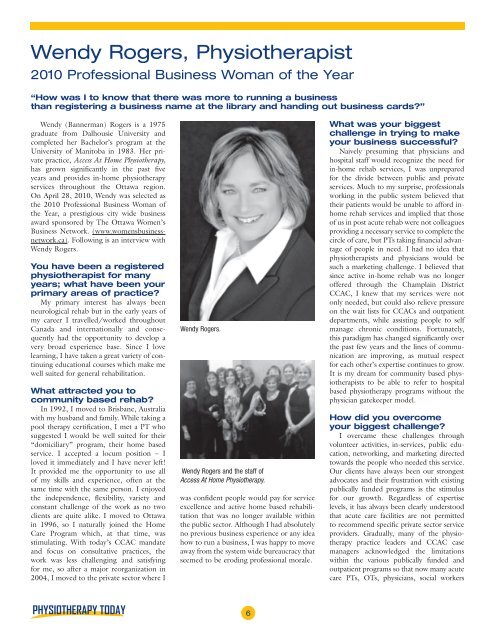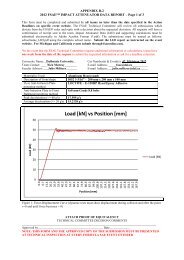2011 APTEI Acupuncture & Dry Needling (ADN) Program
2011 APTEI Acupuncture & Dry Needling (ADN) Program
2011 APTEI Acupuncture & Dry Needling (ADN) Program
Create successful ePaper yourself
Turn your PDF publications into a flip-book with our unique Google optimized e-Paper software.
Wendy Rogers, Physiotherapist<br />
2010 Professional Business Woman of the Year<br />
“How was I to know that there was more to running a business<br />
than registering a business name at the library and handing out business cards?”<br />
Wendy (Bannerman) Rogers is a 1975<br />
graduate from Dalhousie University and<br />
completed her Bachelor’s program at the<br />
University of Manitoba in 1983. Her private<br />
practice, Access At Home Physiotherapy,<br />
has grown significantly in the past five<br />
years and provides in-home physiotherapy<br />
services throughout the Ottawa region.<br />
On April 28, 2010, Wendy was selected as<br />
the 2010 Professional Business Woman of<br />
the Year, a prestigious city wide business<br />
award sponsored by The Ottawa Women’s<br />
Business Network. (www.womensbusinessnetwork.ca).<br />
Following is an interview with<br />
Wendy Rogers.<br />
You have been a registered<br />
physiotherapist for many<br />
years; what have been your<br />
primary areas of practice?<br />
My primary interest has always been<br />
neurological rehab but in the early years of<br />
my career I travelled/worked throughout<br />
Canada and internationally and consequently<br />
had the opportunity to develop a<br />
very broad experience base. Since I love<br />
learning, I have taken a great variety of continuing<br />
educational courses which make me<br />
well suited for general rehabilitation.<br />
What attracted you to<br />
community based rehab?<br />
In 1992, I moved to Brisbane, Australia<br />
with my husband and family. While taking a<br />
pool therapy certification, I met a PT who<br />
suggested I would be well suited for their<br />
“domiciliary” program, their home based<br />
service. I accepted a locum position – I<br />
loved it immediately and I have never left!<br />
It provided me the opportunity to use all<br />
of my skills and experience, often at the<br />
same time with the same person. I enjoyed<br />
the independence, flexibility, variety and<br />
constant challenge of the work as no two<br />
clients are quite alike. I moved to Ottawa<br />
in 1996, so I naturally joined the Home<br />
Care <strong>Program</strong> which, at that time, was<br />
stimulating. With today’s CCAC mandate<br />
and focus on consultative practices, the<br />
work was less challenging and satisfying<br />
for me, so after a major reorganization in<br />
2004, I moved to the private sector where I<br />
Wendy Rogers.<br />
Wendy Rogers and the staff of<br />
Access At Home Physiotherapy.<br />
was confident people would pay for service<br />
excellence and active home based rehabilitation<br />
that was no longer available within<br />
the public sector. Although I had absolutely<br />
no previous business experience or any idea<br />
how to run a business, I was happy to move<br />
away from the system wide bureaucracy that<br />
seemed to be eroding professional morale.<br />
6<br />
What was your biggest<br />
challenge in trying to make<br />
your business successful?<br />
Naively presuming that physicians and<br />
hospital staff would recognize the need for<br />
in-home rehab services, I was unprepared<br />
for the divide between public and private<br />
services. Much to my surprise, professionals<br />
working in the public system believed that<br />
their patients would be unable to afford inhome<br />
rehab services and implied that those<br />
of us in post acute rehab were not colleagues<br />
providing a necessary service to complete the<br />
circle of care, but PTs taking financial advantage<br />
of people in need. I had no idea that<br />
physiotherapists and physicians would be<br />
such a marketing challenge. I believed that<br />
since active in-home rehab was no longer<br />
offered through the Champlain District<br />
CCAC, I knew that my services were not<br />
only needed, but could also relieve pressure<br />
on the wait lists for CCACs and outpatient<br />
departments, while assisting people to self<br />
manage chronic conditions. Fortunately,<br />
this paradigm has changed significantly over<br />
the past few years and the lines of communication<br />
are improving, as mutual respect<br />
for each other’s expertise continues to grow.<br />
It is my dream for community based physiotherapists<br />
to be able to refer to hospital<br />
based physiotherapy programs without the<br />
physician gatekeeper model.<br />
How did you overcome<br />
your biggest challenge?<br />
I overcame these challenges through<br />
volunteer activities, in-services, public education,<br />
networking, and marketing directed<br />
towards the people who needed this service.<br />
Our clients have always been our strongest<br />
advocates and their frustration with existing<br />
publically funded programs is the stimulus<br />
for our growth. Regardless of expertise<br />
levels, it has always been clearly understood<br />
that acute care facilities are not permitted<br />
to recommend specific private sector service<br />
providers. Gradually, many of the physiotherapy<br />
practice leaders and CCAC case<br />
managers acknowledged the limitations<br />
within the various publically funded and<br />
outpatient programs so that now many acute<br />
care PTs, OTs, physicians, social workers



